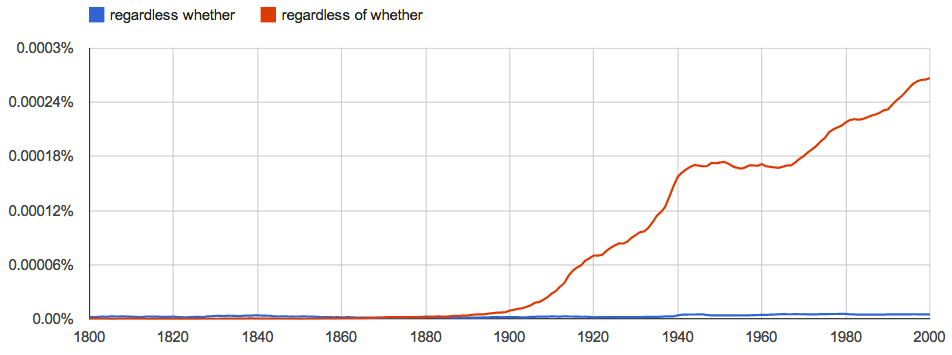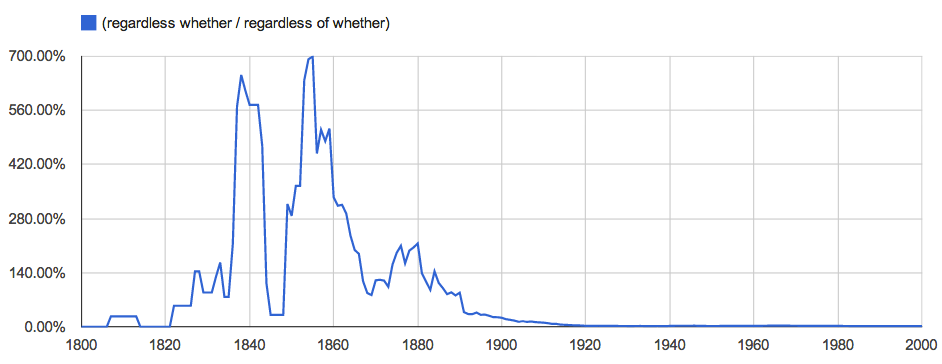Regardless (of) whether
« previous post | next post »
Reader ST writes to draw our attention to Bryan Garner's 1/2/2012 note on "regardless whether":
Language-Change Index — “regardless whether”* for “regardless of whether”: Stage 2.
*Invariably inferior forms.
The "Stage 2" designation is a reference to Garner's five-stage "Language-Change Index":
Stage 1 (“rejected”): A new form emerges as an innovation (or a dialectal form persists) among a small minority of the language community, perhaps displacing a traditional usage (e.g.: “your” misused for “you’re”).
Stage 2 (“widely shunned”): The form spreads to a significant fraction of the language community but remains unacceptable in standard usage (e.g.: *”pour over books” for “pore over books”).
Stage 3 (“widespread but . . .”): The form becomes commonplace even among many well-educated people but is still avoided in careful usage (e.g.: “clinch” misused for “clench”).
Stage 4 (“ubiquitous but . . .”): The form becomes virtually universal but is opposed on cogent grounds by a few linguistic stalwarts (die-hard snoots) (e.g.: “often” pronounced “OF-tuhn”").
Stage 5 (“fully accepted”): The form is universally accepted (not counting pseudo-snoot eccentrics) (e.g.: “decimate” for inflicting large-scale destruction).
But attitudes towards usage do not always follow this script, as we can learn from Diana's comment on Garner's post:
Bryan, I’ve long looked to your writing guidance as The Word, so I must respond to your 01/02/12 blog entry on “regardless of whether.” Ouch, that just sounds so awful! NYU Law was pretty open-minded, but it was drilled into us that proper usage excludes any “of” in the phrases “regardless whether,” “the question is whether” or “the question whether.” In your writing seminar in the 90′s, the most valuable exercise was editing text to eliminate as many “ofs” as possible. True gold! Now you say it’s a Stage 2 mistake and advocate using that unnecessary, ugly-sounding ‘uv’ here — where it makes the speaker/writer sound illiterate and pompous?
And as ST points out, the Google Books ngram corpus seems to indicate that "regardless of whether" is the innovation:
In the 19th century, neither variant was very common, but "regardless whether" was much commoner:
ST notes that in the older pattern of usage, regardless is usually predicated of a person (“You were indifferent, and regardless whether you gained their good will or not”). In such cases, the whether clause is the complement of the adjective regardless. In the more modern pattern, the whole "regardless of whether S" structure is a sentence-level adverbial, and the whether clause is a headless relative doing duty as a noun phrase, e.g. in this quotation from David Brooks:
[C}ountries with high social trust have happier people, better health, more efficient government, more economic growth, and less fear of crime (regardless of whether actual crime rates are increasing or decreasing).
(Note that he could have written something like "…regardless of the fact that crime rates might be increasing".)
So perhaps, in the sentence-adjunct usage, "regardless whether" is indeed an innovation. This is a case where simple word-string counting doesn't give us the answer. We need a a two-by-two classification (syntactic function of the whole phrase, crossed with presence or absence of "of"), and one of the dimensions requires some syntactic analysis. Pending further investigation, I'll leave the question open.
My own intuitions, for what little it's worth, are on Bryan Garner's side of the usage decision. I prefer "regardless of whether" — and I just checked previous LL postings to verify that it's what I generally (always?) write. But I wouldn't judge the of-less version as a mistake on the level of "pour over" for "pore over", or indeed as a mistake at all. And I'm not sure just who has innovated what here.
In any case, we still need to understand Diana's comment, which illustrates the fact that prescriptive usage norms are not always –and maybe not often — a simple matter of the gradual acceptance of innovation.


D-AW said,
December 7, 2012 @ 6:21 pm
My intuition was that "regardless of if" would be a big zero, but the trigram alone show some (very small) acceptance after 1950. Nowhere near "regardless of whether", though. Taking account of whether/if disputes, is the difference only prosodic?
[(myl) If-clauses are somewhat more reluctant to serve as noun phrases, I think. So in formal writing you get things like
The Intelligence Committee has considered the commercial sale of U.S. satellite imagery largely within the context of whether it is appropriate to allow U.S. manufacturers and operators to sell satellites and the imagery they produce to other governments.
But if United Airlines Flight 93 had not crashed in Pennsylvania, the three pilots from Langley — two of them commercial airline pilots themselves — may have faced the nightmarish decision of whether to shoot down the commercial airliner, along with its 38 passengers and crew of seven.
Reliability includes the issue of whether two different raters tend to give the same ratings when reviewing a study (inter-rater agreement).
In formal writing, similar things with "if" are rare to nonexistent; and I think nominal if-clauses are rarer in speech as well.]
Mat Bettinson said,
December 7, 2012 @ 6:39 pm
"was much commoner"* for "was much more common"
… to my international English ear, this sounds very stage 2. :)
[(myl) No doubt.
From the first edition of Fowler's A Dictionary of Modern English Usage:
]
Ryan said,
December 7, 2012 @ 6:43 pm
I don't think Diana should be calling other people 'pompous' when she has the gall to label people 'illiterate' for using a miniscule preposition that she happens not to like. Sheesh.
Kelt Locke said,
December 8, 2012 @ 12:51 am
From Diana's comment, I gather that someone has declared war on "of." That might explain why I see so many writers using the expression "a couple _________" instead of "a couple of _____________." That sets my teeth on each, but then, I'm an old guy who still uses "proven" instead of "proved," etc.
Kelt Locke said,
December 8, 2012 @ 12:53 am
An erratum: In the post I just sent, "each" should be "edge." – Kelt
Levni said,
December 8, 2012 @ 2:11 am
In response to Mat Bettinson's comment rather than the original post, it's very sad that trisyllabic comparatives and superlatives are increasingly being looked upon with suspicious. Words like 'commoner' and 'oftener' are rarely encountered nowadays, which is fine, but those of us who still like to use them are frequently treated as if we're doing something grammatically questionable. I said 'handsomest' recently, and the person I was talking to was convinced that I had made the word up. Up to the nineteenth century, even words like 'beautiful' could take -er and -est, as the suffix was construed as belonging to the 'full'.
GeorgeW said,
December 8, 2012 @ 5:52 am
To me (SoAmE), "commoner" is a noun for a member of class of people.
Levni said,
December 8, 2012 @ 9:04 am
Regarding 'proved' and 'proven', I don't think use of the former as the past participle is new. In British English at least, 'has proved' is entirely standard, and has been so for a long time, though 'proven' is commoner (!) when the participle is being used adjectivally: 'He'd proved his loyalty', 'A proven method'.
(Unrelated, but 'suspicious' in my earlier post should have been 'suspicion'.)
Breffni said,
December 8, 2012 @ 12:41 pm
That suggests that the modern 'regardless of' sentence adverbial started life as a dangling predicative adjunct. So a sentence like 'Regardless of the consequences, it is the only red line position we have' might have sounded as odd as 'Heedless of the consequences, it is the only red line position we have' does to us. I wonder if there's any history of complaint about this development? Kingsley Amis insisted (in The King's English) that 'Having said that' should always be followed by 'I must also say…' (something like that, don't have the book to hand), presumably on the grounds that it dangles otherwise. Would he have had the same concerns about 'regardless'?
Nelida K. said,
December 8, 2012 @ 1:00 pm
To my international English (native Spanish) ear, "regardless whether" is grating, it is suggestive of somebody inadvertently having left out the "of". Therefore, I stand on Bryan's side in this. I think that maybe Diana's comments hinge more on "whether", while I believe that the question here rests more on "regardless". To my mind, regardless always takes an "of". [Such as in 'regardless of this', 'regardless of that']. This is not always the case with "whether", which may or may not take a proposition, according to context.["I wonder whether this is right", but "regardless of whether this is right"]. IMHO.
John Walden said,
December 8, 2012 @ 4:06 pm
I've always thought that "careful usage" was Weaselish for "People Like Us know better, though we have to pay lip service to usage".
"Inferior" sounds archer still. Garner may sometimes make sensible pronouncements, though never not based on his idiosyncrasies, but this time he sounds merely patrician. Not in the least bit objective, rigorous or scientific.
I'm not too struck on "shunned" if it comes to that. A bit of careful usage wouldn't go amiss.
Mr Punch said,
December 10, 2012 @ 3:47 pm
My (Random House) dictionary offers two definitions: "regardless" which is 'often fol. by 'of') means having or showing nor regard, heedless or unmindful; "regardless of" means "in spite of, without regard for." This seems right to me; and "regardless [of] whether" would seem to fall under the second usage, in which "of" is (let's say) strongly preferred by many.